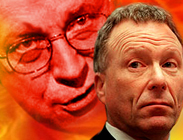None of these witnesses have information on communications between Team Libby and Bush, Cheney and Bush or between Bush and the advisors he consulted about the commutation.
Unless this is just the first of several hearings, I'm disappointed.
When Congress investigated President Clinton's pardons, President Clinton waived presidential privilege and allowed his White House advisors most involved in the decision to testify at the hearing. The Committee was able to conclude there was no evidence Clinton misused his pardon authority.
Why isn't the Committee calling Bush's advisors? According to the Washington Post, Fred F. Fielding, Chief of Staff Joshua B. Bolten and his outgoing counselor, Dan Bartlett advised the President.
No one is challenging Bush's constitutional right to grant the commutation. The issue needing investigation is that Bush commuted Libby's sentence in an investigation his Vice President was in up to his eyeballs. Did he do it to keep Libby quiet? Did he commute Libby's sentence rather than pardon him so that Libby could retain his 5th Amendment privilege against self-incrimination and refuse to testify at congressional hearings or a grand jury about Cheney and/or Bush's role in leaking Valerie Plame's identity?
It seems the Committee wants to hear testimony only on facts we all know: That usually people don't get their sentences commuted until they've done some time; that a court ruled a guideline sentence was proper in the Rita case which had similarities to Libby's case; that Libby's sentence wasn't excessive under the Guidelines and that it was within Judge Walton's discretion to grant or deny Libby a departure or variance from the guideline range. We all know that most people who are convicted of perjury and obstruction of justice get jail time and a regular Joe wouldn't have gotten a get-out-of-jail free card.
As the New York Times opined last week,
Presidents have the power to grant clemency and pardons. But in this case, Mr. Bush did not sound like a leader making tough decisions about justice. He sounded like a man worried about what a former loyalist might say when actually staring into a prison cell.
The Committee should be examining that which we don't know: Was Bush's commutation of Libby's jail sentence just bad judgment? Or, did he do it to silence Libby and prevent him from spilling the beans on Cheney or Bush himself in PlameGate?
I don't see how this group of witnesses is going to shed any light at all on this issue, and it's an issue the public has a right to be concerned about.
As I wrote here, I would like to see Patrick Fitzgerald called as a witness and asked whether he and Team Libby had any discussions after Libby's conviction about Libby providing information to the Government on Cheney and Bush's role in PlameGate in exchange for the Government's filing of a motion for sentence reduction. If there were, and Bush knew about them, there's an increased chance this commutation was based on improper motives.
On Sunday, Rep. Conyers said:
"What we have here _ and I think we should put it on the table right at the beginning _ is that the suspicion was that if Mr. Libby went to prison, he might further implicate other people in the White House, and that there was some kind of relationship here that does not exist in any of President Clinton's pardons, nor, according to those that we've talked to ... is that it's never existed before, ever," Conyers said in a broadcast interview Sunday.
Has the Committee decided to forego that aspect of the investigation?
Update: Rep. Conyers
sent a letter to Bush Monday asking him to waive executive privilege and allow his aides who participated in the commutation discussions to testify before the committee. My criticism may be premature, particularly if multiple hearings are going to be held.





